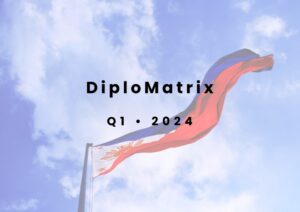In his latest column “Lettre d’Asie”, David Baverez, member of the Asia Centre’s Advisory Board, gives his analysis regarding the advantages that a victory of the Rassemblement National in the presidential elections would represent for mainland China.
This column can be found on the newspaper L’Opinion’s website and in the text that follows:
“Electing Marine Le Pen would play into China’s hands” – David Baverez’s column
By David Baverez
A quick political-fiction exercise allows us to draw the consequences for China of an election of the far-right candidate. The scenario would be far from being displeasing to Beijing, according to David Baverez.
Although China has the good habit of never meddling in other countries’ internal affairs, it is not unconcerned by the result of the presidential election in France [1]. Three elements lead us to believe that Beijing would be particularly favourable to the election of the Rassemblement National candidate.
First, on the geopolitical level. The new Beijing-Moscow axis, based on a new “unlimited friendship”, could be extended to Paris, by relying on the proximity already maintained by Marine Le Pen with Vladimir Putin [2]. At a time when China is clearly displaying its desire to build a re-globalisation of the world, based on its de-Westernisation, the Middle Kingdom is looking for any potential source of weakening Europe.
The divorce of the Franco-German couple [3], an inevitable result of a victory of the extreme right, would allow Beijing to forget its unsuccessful attempts to seduce certain Eastern European countries or Italy. For the Chinese leaders, if Emmanuel Macron [4] was the President who tipped France definitively into Southern Europe, Marine Le Pen would ideally be the president who could sell it off to the East.
Then, on the economic level. China knows to what extent national preference is a double-edged sword. Applied to the space of a continent such as the Middle Kingdom, it initially makes it possible to build a local industry with a global competitive advantage, boosted by economies of scale. Limited to a medium-sized country such as France, it leads in the long term to an inevitable decline, because it contributes to slowing down innovation and creativity.
This is something that could please Chinese leaders, who are aiming to strengthen their 5-point market share gains in global manufacturing exports achieved in 2021 in the midst of Covid crisis! Likewise, the candidate’s programme for improving purchasing power – a catalogue à la Prévert that never mentions the necessary search for corresponding productivity – can only delight Beijing, which continues to believe that, for “common prosperity”, “a mouth is also two arms”.
Finally, on the financial level. Whatever the outcome of the election, Marine Le Pen will have won, according to the Montaigne Institute, the prize for the least financed spending programme. The creeping “Japaneseisation” of French public finances would necessarily lead to the further discrediting of the euro. This loss of credit would thus contribute to the relative strengthening of the renminbi, prolonging its already 30% appreciation against the European currency over the last decade.
The “chronicle of an announced pauperisation” of French savers, through unprecedented negative real rates under the Fifth Republic, would allow the renminbi, in a decisive way, to better prepare itself to impose itself as an alternative to the dollar. As a result, the euro would lose its status as the second currency of world trade, especially in those parts of the world most eager for de-dollarisation, starting with the Middle East.
The programme is thus clearly announced: weakening of Europe, deindustrialisation’s acceleration[5], marginalisation of the euro: “Beijing dreamed of it, Marine proposed it”… It is up to the people of France to wake up!
David Baverez is a Hong Kong-based investor since 2011. He is the author of _China-Europe : le grand tournant _(Le Passeur Éditeur, 2021).
Links:
——
https://www.lopinion.fr/electi
[2]
https://www.lopinion.fr/intern
[3]
https://www.lopinion.fr/intern
[4]
https://www.lopinion.fr/electi
[5]
https://www.lopinion.fr/econom




